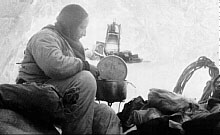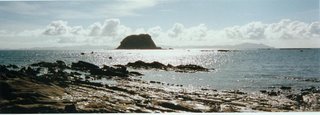I was talking with a friend the other day, and she told me that she’d been so moved by reading Ken Arvidson’s poem “Four Last Songs” (full title: “The Four Last Songs of Richard Strauss at Takahe Creek above the Kaipara”) when she was a kid, that it actually came as a disappointment to her when she finally got to listen to Strauss’s music.
It’s funny. I had precisely the opposite experience. I’d always had a secret hankering to listen to Strauss’s piece called Tod und Verklärung [Death and Transfiguration] just because of the cool title, and I bought another CD with the Vier letzte Lieder [Four Last Songs] on it at the same time just as an afterthought.
Death and Transfiguration was pretty cool, I must say, but the Four Last Songs were just amazing. They were sung by Jessye Norman, and her voice seemed supernatural at times – like some of the soprano effects in the Ninth Symphony or The Magic Flute. I still get the shivers thinking about it.
It was a strange time for me. I’d just come back from the UK with my Doctorate, and couldn’t find any work except teaching tutorials at Massey, Palmerston North (oh, a friend of my father’s offered me a job cleaning her shop, but at the time I felt a little overqualified for it – now I suspect I’d feel a little underqualified).
I was recently married, so the two of us trekked off to Palmy, where I’d managed to rent us a very solidly bourgeois brick house on the outskirts of town. Having an actual salaried job for the first time meant that I actually had a bit of money, even after rent and bills, hence the splashing out on two CDs.
The other thing that happened just then was my discovery, in a little alcove cupboard of the house we were renting, of a huge library of Antarctic books gathered by our landlady’s uncle (I think – can’t quite be sure at this distance in time).
So that was our winter. Bicycling everyday to work through the park and over the traffic-clogged bridge. On the other side of the river I would branch off right towards Massey (where I kept a complete change of clothes in my little prefabricated hut of an office), and J-A would peddle off left to teach at the Japanese college on the hill (New Zealand studies, among other things – it seemed a curious thing for a multilingual European to be assigned to cover).
Then, when we got home, we would listen to music and watch drossy TV (no video – so we were at the mercy of the programmers) while I worked my way through Herbert Ponting and Frank Worsley and Ernest Shackleton and – above all – Douglas Mawson’s The Home of the Blizzard. The books were mostly huge double-volumed first editions with banks of photographs and endless appendices of observations and maps (pruned off for the cheaper “popular” editions, which he'd also taken the trouble to collect). Our landlady’s uncle had clearly been obsessed by the subject, and it came to obsess me more than a little too.
One bright day I found a brand-new, lavishly-illustrated edition of Mawson’s original expedition diaries in the bookshop in town (if you have to live in a small town, it’s always best to choose one with a university in it – there’s bound to be some good bookshops and a good cinema too: those are two commodities students (and their teachers) are always in need of).
This became a kind of Bible for me. It was incomparably more vivid and frank than the written-up account that actually reached publication, and seemed to take me to some of the same places in human suffering chronicled years later in the film Touching the Void. Eventually all this would grow into the Antarctic section of my first novel, Nights with Giordano Bruno (published by Bumper Books in 2000), but at the time I tried to express this complex of emotions and dislocations in a poem.
It’s never been published before (although I have tried it on editors from time to time in a half-hearted sort of way), and its faults are very obvious to me, but it still has (for me at least) an atmosphere of that strange period in my life, fifteen years ago, on the other side of a turbid creek of personal turmoil and upheaval.
I offer it here on the day of Leicester's funeral as an expression of good wishes for his own personal Death and Transfiguration ...
•
Tod und Verklärung
(for J-A)
Sir Douglas Mawson, the Australian explorer, was in Adélie Land between 1912 and 1914. It is probably the most inhospitable region of Antarctica (he called his account of the expedition The Home of the Blizzard). The idea was that he should survey one side of the continent, while Ernest Shackleton travelled to meet him from the other. However, Shackleton’s ship, the Endurance, was crushed in the ice, so the crossing was never attempted.
[This is all completely inaccurate, by the way – but I’m leaving the poem here as I originally wrote it. While Mawson did have discussions to this effect with “the boss” in London, actually the two expeditions didn't coincide. It was left to another group of hapless souls to lay depots for Shackleton’s doomed Antarctic crossing]
A terrible catastrophe happened soon after taking latitude ... I looked behind & saw no sign of Ninnis & his team. I stopped & wondered, then bethought myself of the crevasse ... Came back, called & sounded for an hour. Read the Burial Service
– 14th December 1912
Ninnis dead
24 miles back,
Xavier as well – buried in his bag.
Meanwhile, in Germany,
orchestras attack
the prick of Richard Strauss.
Rilke burrows deep
in drifts of office files
(ashamed of hymning war).
Futile to despair –
discord in the hut
as Whetter takes a rear ...
Whetter was sick last night, diarrhoea. He sleeps all day today though stating that he would get up and get ice this afternoon. Whetter is not fit for a polar expedition
– 11th June 1912
•
II
May God Help us.
– Mawson, 14th December 1912
No light from the Hut, it is difficult to tell when one is on top of it. Outside one is in touch with the sternest of Nature – one might be a lone soul standing in Precambrian times or on Mars – all is desolation and hard in the durest
– 9th April 1912
The landscape makes one think of Greece
(Mawson himself contributes a few lines):
sun-beaten cyclamen, unceasing
wind on coastal pines.
Here darkness, gales, a desert
without dunes – sastrugi,
bitter care, crevasses,
Ninnis and his dog-team.
The bursting sun of Wagner –
what to dramatise?
This lunar quiet, blind echoes
in a maze ... huts over the next rise?
•
III
It will be generally admitted that Beethoven’s Fifth Symphony
is the most sublime noise that has ever penetrated into the ear of man– E. M. Forster, Howards End (London, 1910)
11.30 pm: … Will the hangar stick it? Will the screens stand the strain? It is indeed difficult to understand how air can flow so swiftly
– 17th May 1912
Let’s not blame Strauss – this landscape of the Moon
was not dreamed up by Ludendorff or Haig.
The wind cuts wires, wears down the planet’s skin.
Making a “beautiful noise” is not so easy
– the screech of amateurs offends the air.
(how can it move so fast ... relentlessly?)
Some day the guns will be silenced; not so the howl
of the “perpetual anticyclone” of Adélie ...
King George’s land – acceptance with a scowl.
The new land east of the Mertz glacier we have received his Majesty’s gracious permission to name King George V. land
– 1914
•
IV
Very soft shifting snow, or else I would have done better
– Mawson, 22nd January 1913
You see, my love, this disk of polished steel
and Mawson’s Antarctic Notes
aren’t far apart.
amongst those here at Commonwealth Bay are a number of the very type of men who have made Great Britain what she is, and Europe what she is, and will, I venture to think, – make Heaven out of Hell
– 3rd May 1912
Too late, now, for revision –
Four Last Songs composed
on the abyss.
What do you see when face to face …
with nothing? Who’s to say
except our pal?
The tent is closing in by weight of snow and is about coffin size now
– 25th January 1913
So let’s just listen – something there that’s
noble,
notes of a man
unbeaten,
refusing to lie down
in the soft snow.
Trust in Providence and my crampons
– 3rd February 1913
(5-9/8/91)
Saturday, July 08, 2006
Four Last Songs
Labels:
Ken Arvidson,
poetry,
review,
Richard Strauss,
Tod und Verklarung
Wednesday, July 05, 2006
We Were Talking

David Howard writes in to say that this poem by Leicester appeared in the Press today. I guess that as joint literary executors we can jointly give permission for it to appear here. Please also check out the fine obituaries here and here on the Reading the Maps blog ...
Labels:
David Howard,
elegies,
guests,
Leicester Kyle,
poems,
The Press
Tuesday, July 04, 2006
Leicester Kyle 30.10.37-4.7.2006
Leicester passed away this morning at 1.28 a.m.
"The sky is white as clay, with no sun.
Work has to be done.
Postmen like doctors go from house to house."
-- Philip Larkin, "Aubade"
Subscribe to:
Comments (Atom)


